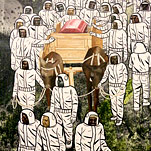WASHINGTON — In late August, Senate Democrats gathered on a conference call with President Obama’s national security adviser, Susan E. Rice, to hear why the administration had to respond militarily to a chemical weapons attack by the Syrian government.
Senator Manchin Takes On Democratic Party Leaders in Pursuit of a Middle Ground
Senator Joe Manchin: In His Own Words: In selections from a recent interview with Jonathan Weisman, Senator Joe Manchin III, Democrat of West Virginia, talks about sticking to his principles and the worst that can happen to a politician.
By JONATHAN WEISMAN
Published: November 13, 2013
Contribute to Our Reporting
The Times would like to hear from Americans who have begun to sign up for health care under the Affordable Care Act.
Related
-
Health Website Official Tells of White House Briefings (November 14, 2013)
-
Obama in Bind Trying to Keep Health Law Vow (November 13, 2013)
-
Political Memo: Fighting to Stop an Entitlement Before It Takes Hold, and Expands (November 13, 2013)
Gabriella Demczuk/The New York Times
Senator Joe Manchin III of West Virginia is trying to delay key parts of President Obama’s health care law and to force significant changes in how it is carried out.
Senator Joe Manchin III of West Virginia hung up, took a phone call from another red-state Democrat, Heidi Heitkamp of North Dakota, and together they rejected their president’s reasoning. Within days, they were circulating new language calling for a diplomatic solution. Republicans joined the effort, Secretary of State John Kerry eventually endorsed a similar approach, and with the American public dubious about intervention, the drive toward a military strike fizzled.
It has been that way all year for Mr. Manchin, a centrist Democrat from an increasingly Republican state who has shown an impulsive, almost reflexive, willingness to reject the position of his leaders and try to entice fellow senators to a middle ground. Now he is trying to delay parts of the new health care law, the latest effort by Mr. Manchin, a former governor and the grandson of an Italian immigrant, to engage on virtually every issue flaring up on Capitol Hill, just as he did in West Virginia.
“There wasn’t anything going on in any part of the state that he wasn’t involved in,” said State Senator Jack Yost, a Democrat who had his share of clashes with a governor more inclined to bipartisanship than some in his party always liked. “It doesn’t surprise me that he has his hands in everything there, too.”
As he nears the three-year mark in the Senate, Mr. Manchin has found himself sometimes on the president’s side, and sometimes a thorn in his side. In a state where Mr. Obama got just 36 percent of the vote in 2012, that is just fine, said Gil White, who served in the Legislature for 14 years as a Republican before working for the governor as his chief legislative liaison. “I don’t think that Joe has anything to worry about regarding his West Virginia base,” Mr. White said.
Mr. Manchin’s latest gambit — to delay key parts of the president’s health care law and force significant changes — may prove his most significant so far.
It has fed Republican hopes that a nearly united Democratic front backing the Affordable Care Act may be cracking. It has spooked White House and health insurance company officials who worry that his push for legislation to reinstate canceled insurance plans will undermine the law and hurt the insurance market, and that his push to delay penalties on those who fail to buy insurance and to extend the enrollment period will undermine efforts to ensure that young adults enter the market at the same time those with higher health risks do. And his call to redefine part-time workers under the law as those who work fewer than 40 hours a week, not 30, could significantly raise the Affordable Care Act’s cost to the federal government.
Mr. Manchin said he had discussed his concerns with the White House chief of staff, Denis McDonough, who has counseled Democrats to be patient before calling for any such changes. But the West Virginian shows no sign of backing down.
“I’m respectful. I want my president to do well,” he said of a commander in chief who is unpopular in his state. But, Mr. Manchin added firmly, “I have never been against something unless I had a better idea,” and he says he believes penalizing people for not buying insurance from a website they are struggling to gain access to is a bad idea.
To some of his colleagues, his iconoclasm, industry and impulsiveness can be taxing. He springs his latest enterprise on the public with little or no consultation with leadership — or even staff. But Mr. Manchin’s jovial penchant for taking on serious tasks without seeming terribly serious brings senators along.
“You rarely see any senator get involved in more issues so quickly and yet so effectively,” said Senator Charles E. Schumer of New York, the Senate’s No. 3 Democrat.
Mr. Manchin, who once fired a rifle at the president’s “cap and trade” energy bill in an ad, proved an unlikely ally at the start of 2013 as Mr. Obama sought a bipartisan deal on background checks for gun purchases. Mr. Manchin broke down in tears in his office as the parents of children slain in Newtown, Conn., pleaded for action. His background check bill, written with Senator Pat Toomey, a Pennsylvania Republican, nearly kept a sweeping gun safety bill on track. But the effort fell short. He has swerved away from the administration and his Senate leaders.
- 1
- 2











